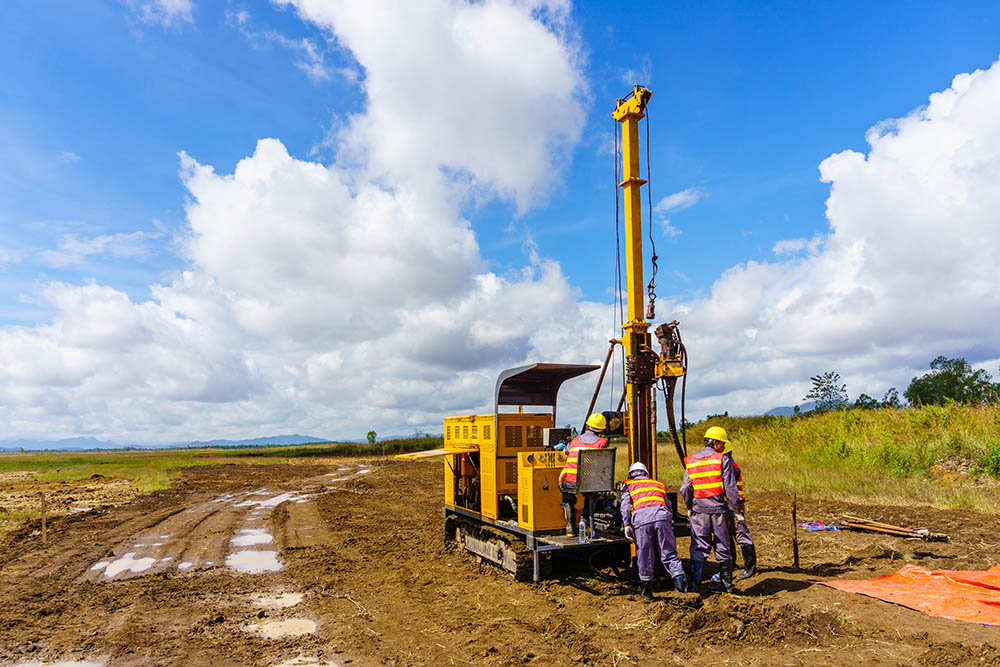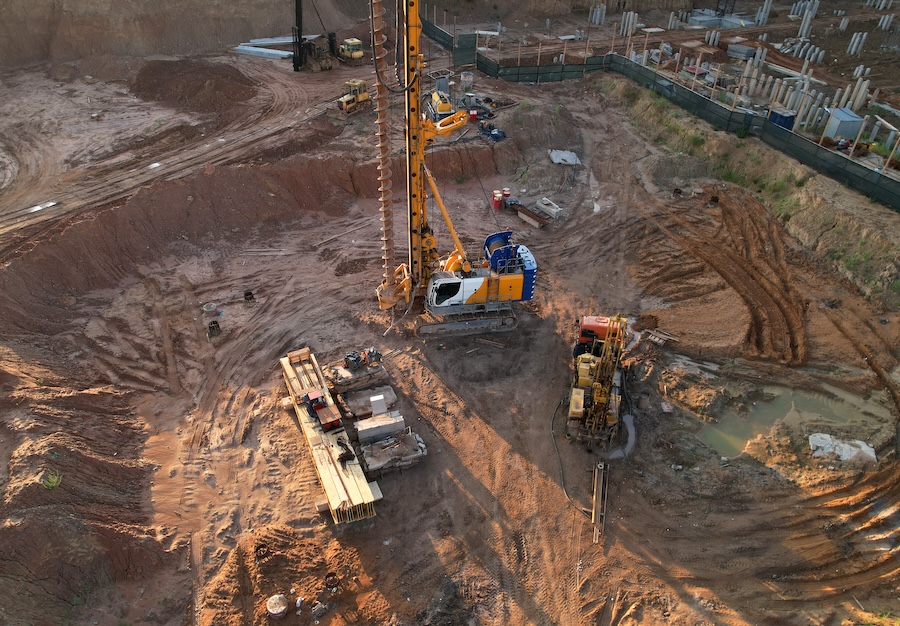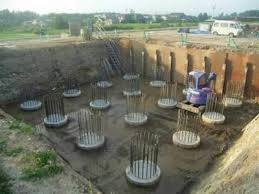Finding the most effective Geotechnical Companies in South Africa: Secret Considerations
Finding the most effective Geotechnical Companies in South Africa: Secret Considerations
Blog Article
The Importance of Geotechnical Engineering in Addressing Ecological Obstacles and Enhancing Construction Safety
Geotechnical engineering offers as a keystone in the intersection of ecological stewardship and building and construction safety and security, offering crucial understandings into the actions of soil and rock under different conditions. By executing strategic site examinations and customized reduction procedures, geotechnical designers play a vital duty in protecting both human lives and eco-friendly honesty.

Role of Geotechnical Design
Geotechnical design plays a crucial duty in the design and building of infrastructure by addressing the habits of soil and rock products under various problems. This field of engineering is crucial for recognizing the communication between structures and the ground, which includes establishing the load-bearing capacity of dirt, evaluating security, and forecasting prospective settlement or failing.
Geotechnical engineers are in charge of performing site examinations, which include sampling and screening soil and rock to collect information on their physical and chemical homes. This details is vital for designing foundations, maintaining wall surfaces, and various other earth-retaining frameworks that ensure safety and security and long life. Furthermore, geotechnical design notifies the choice of suitable construction methods and materials, thereby lessening risks connected with dirt behavior.
Furthermore, the assimilation of geotechnical engineering principles right into city preparation and environmental monitoring is important for resolving difficulties such as ground contamination and groundwater management. By comprehending geotechnical variables, engineers can establish lasting solutions that improve the resilience of framework versus all-natural threats, while additionally promoting environmental stewardship. Eventually, the function of geotechnical design is essential for achieving safe, resilient, and ecologically conscious building and construction techniques.
Dirt Disintegration Mitigation
Soil erosion presents a significant threat to both environmental stability and framework honesty, influencing around 24 billion lots of abundant dirt shed every year worldwide. This sensation is intensified by elements such as deforestation, urbanization, and inadequate agricultural techniques. Geotechnical design plays an essential function in creating efficient dirt disintegration reduction approaches that guard both the environment and building and construction jobs.
One technique involves the execution of disintegration control methods such as vegetation planting, which supports dirt with root systems. In addition, the construction of maintaining balconies and walls can effectively reduce surface runoff and safeguard susceptible areas from disintegration. Appropriate drain design is additionally important; it reduces water buildup and routes excess drainage away from vital frameworks.
Additionally, geotechnical designers use dirt stabilization strategies, such as the application of geotextiles and biodegradable floor coverings, to enhance dirt cohesion and prevent deterioration - geotechnical specialist. Regular tracking and evaluation of erosion-prone websites allow prompt treatments, guaranteeing long-lasting sustainability. By incorporating these methods, geotechnical design not just minimizes the effects of dirt disintegration but also adds to the durability of framework versus ecological challenges, inevitably promoting a more secure and more lasting constructed setting
Groundwater Defense Strategies
Groundwater serves as an important resource for drinking water, agriculture, and industrial procedures, making its defense important for environmental sustainability and public health. Effective groundwater security methods are essential in mitigating contamination threats and making sure the longevity of this resource.

Routine surveillance of groundwater quality is likewise necessary, allowing very early detection of contamination resources and assisting in prompt remediation initiatives. Utilizing advanced technologies, such as geophysical surveys and remote picking up, help in determining possible threats to groundwater reserves.
Additionally, public education and stakeholder interaction are crucial, fostering Continued community assistance for groundwater protection initiatives. all about geotechnical engineering. By integrating regulative procedures, technological innovations, and community involvement, we can create a detailed framework that safeguards groundwater resources while promoting lasting advancement and building and construction techniques
Landslide Danger Management
Landslides present considerable hazards to both human safety and facilities, making reliable risk management techniques necessary. Geotechnical engineering plays a crucial duty in recognizing, examining, and mitigating landslide dangers. A thorough understanding of incline security, dirt auto mechanics, and hydrology is essential for establishing effective danger management plans.
The very first step in landslide threat sites management entails complete site examinations, that include geological mapping and soil testing. These investigations help designers assess the possibility for landslides by determining vital factors such as slope angles, dirt composition, and water web content. Using advanced innovations such as remote picking up and geophysical surveys can improve the precision of these assessments.
When risks are identified, ideal reduction measures can be carried out. These may include design remedies such as preserving wall surfaces, drainage systems, and incline stablizing techniques. Additionally, keeping an eye on systems must be established to identify indicators of ground movement and modifications in water degrees, allowing for proactive interventions.

Enhancing Construction Safety
Building websites often provide a myriad of hazards that can threaten worker safety and security and job integrity. Geotechnical engineering plays a crucial role in boosting construction safety and security by giving vital insights into subsurface conditions. With detailed soil and rock evaluation, geotechnical engineers can determine possible risks, such as dirt instability, groundwater concerns, and seismic susceptabilities, which might compromise the safety of construction activities.
Implementing geotechnical options, such as appropriate foundation style and the use of maintaining structures, alleviates these dangers substantially. These remedies not only guarantee the security of the structures being built yet additionally create a safer working atmosphere for websites building employees.
Additionally, cultivating a society of safety and security via training and adherence to established security protocols additionally boosts building website safety and security. By integrating geotechnical expertise into the preparation and implementation phases, construction projects can attain greater security requirements, inevitably protecting employees and guaranteeing effective task completion.
Final Thought
Finally, geotechnical design serves as a crucial technique in taking on environmental challenges and promoting building and construction safety and security. Through effective soil disintegration reduction, groundwater protection techniques, and landslide risk management, geotechnical engineers add to the development of durable infrastructure. The assimilation of these techniques fosters a more secure building and construction atmosphere and boosts the sustainability of civil design projects. Ultimately, the experience of geotechnical engineers is vital in safeguarding both natural deposits and human lives versus prospective dangers.
Geotechnical design serves as a cornerstone in the junction of ecological stewardship and building and construction security, offering critical insights right into the actions of dirt and rock under numerous conditions. Geotechnical design educates the choice of suitable building methods and products, thereby minimizing threats linked with soil habits.
Geotechnical engineering plays an essential role in developing effective soil disintegration reduction strategies that guard both the atmosphere and building and construction tasks.
In addition, geotechnical engineers use dirt stabilization techniques, such as the application of geotextiles and biodegradable floor coverings, to boost soil communication and stop degradation. Through detailed dirt and rock evaluation, geotechnical designers can recognize potential dangers, such as soil instability, groundwater concerns, and seismic vulnerabilities, which may jeopardize the safety of construction activities.
Report this page